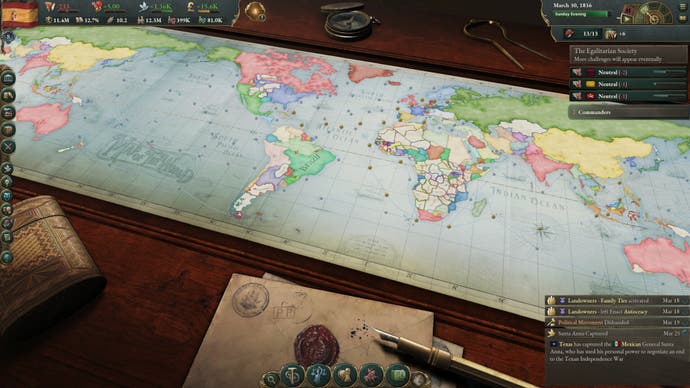Victoria 3 review - gripping grand strategy fuelled by a powerhouse economic simulation
In the black.
Victoria 3 does for simulated economics what Crusader Kings 3 did for playing fuck, marry, kill with medieval popes. Paradox's latest grand strategy is a vivid and engrossing depiction of a world undergoing rapid transformation, letting you plunge elbow-deep into its politics, social reforms, and dizzying technological change. Your focus may be on building ironworks and train stations rather than murdering close family members, but the impact of those infrastructural projects is often just as immediate, and just as gratifying.
Like Crusader Kings and Europa Universalis before it, Victoria 3 lets you pick a particular nation-state and do as you please with it. While there are game modes that focus on specific objectives like economic or military dominance, Victoria 3 is ultimately a giant strategic sandbox that lets you direct the winds of change however you choose. You could transform Victorian Britain into a socialist republic, rest a crown on the temples of Abraham Lincoln, or attempt to conquer the world as the East India Company.
While the options are extensive, they're all funnelled through the same fundamental mechanisms, at the heart of which is your nation's economy. Every country starts out in a different situation, but all economies are built upon a combination of exploiting natural resources, establishing industries, and trade with other nations. Crucially, these industries (and the items they produce) exist in a simulated market where the price of goods is constantly affected by the laws of supply and demand. These laws can have profound effects on the efficiency of your industries and your economy at large.
To give a brief example, let's talk about coal, the fundamental resource upon which the industrial revolution is based. Coal is used in countless different industries in Victoria 3, and as such is in constant high demand. You can meet that demand in several ways, the simplest of which is to expand your existing coal mines (or create new ones in states where available). But mining coal requires tools, another basic resource that is also in high demand. As you expand your coal mines, the number of tools needed goes up, meaning so does the price. If the price of tools rises too high, it can render your coal mines unprofitable.
You can, of course, simply expand your tool workshops to compensate, but doing this will in-turn impact the price of other resources like wood and iron. Alternatively, you could embrace new technology to adjust the production process of tools, such as switching from manual assembly to using a water-tube boiler. This reduces the number of labourers your tool workshops need to employ, and thus the wages you need to pay. HOWEVER, running a water-tube boiler requires – you guessed it – coal. This increases the demand and price of coal, which now impacts the price of the tools that you need to mine the coal in the first place.
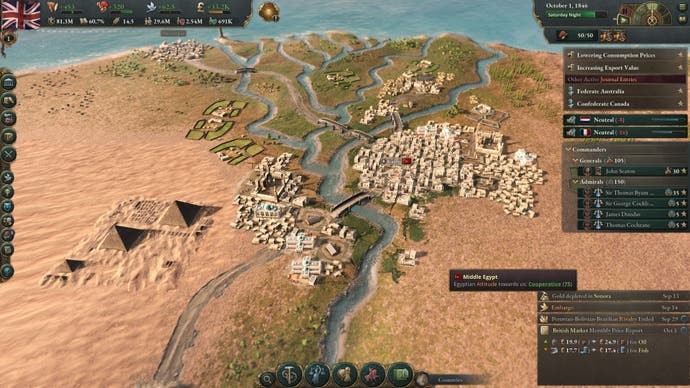
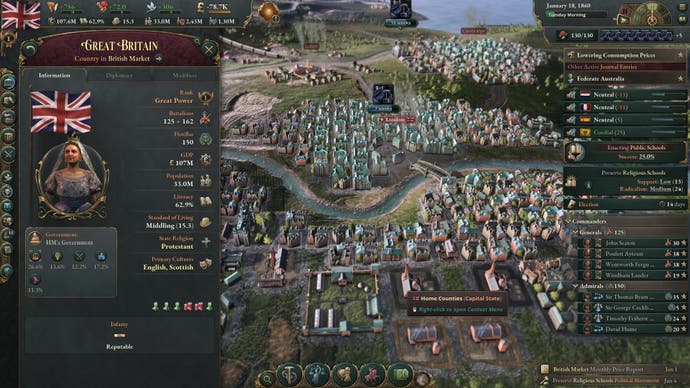
This is one simple example. There are dozens of different industries in Victoria 3. Farms, fisheries, whalers, sulphur mines, steelworks, chemical plants, glassworks, shipyards, automotive manufacturers, munitions factories, and countless more. All are interconnected, influencing the price of the various goods they consume and produce. Markets are further affected by a bunch of other factors. Trading, for example, lets you establish import and export routes for individual goods, as well as set general tariffs to encourage or discourage either of these activities. You must also ensure industries are supported by sufficient infrastructure within their specific region, that your railways and ports can handle the business flowing through them.
If all this sounds complicated, then congratulations, you can read! It's a mightily intimidating system upon first encounter. Fortunately, Victoria 3 is an excellent teacher. Paradox has devised a comprehensive tutorial campaign (which you can play as any nation) that takes you step-by-step through every system and concept that you'll need to learn. Like Crusader Kings 3, the UI conceals an immense library of nested tooltips that appear when you hover over an icon or highlighted word. But the tutorial campaign also transforms the game's journal – used elsewhere for documenting optional objectives – into an interactive handbook. Here, every tutorial goal is underpinned with two buttons labelled "Tell me how" and "Tell me why". These respectively guide you through the methods of performing a particular action, and the reasons for doing so.
Once you've got a handle on it, Victoria 3's economic simulation is utterly absorbing, generating a constantly fluctuating challenge of fathoming which industries need what and how to get it to them at a price that doesn't bankrupt them. It's astonishingly reactive, too. Sometimes you'll implement a new production technique across a particular industry, and your economy will take off like a rocket.
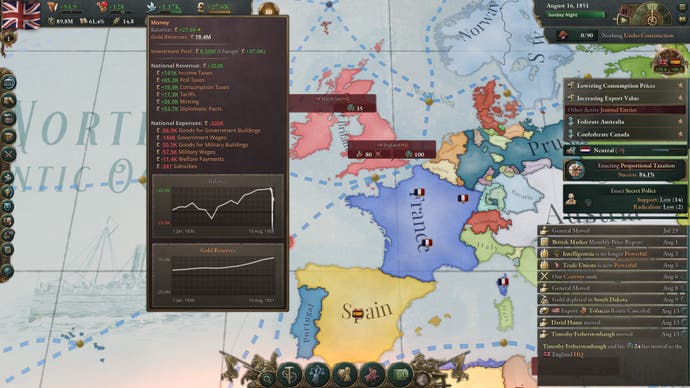
The scenarios this can lead to are often fascinating. It's often worth running certain industries at a loss, so long as they're producing enough resources to support other, more profitable industries. Sometimes it's worth running your entire economy at a loss. Economies in Victoria 3 are based upon the gold standard, and if your gold stockpiles are too high, it devalues your currency. Hence, you need to find ways to either spend or temporarily lose money, such as increasing construction, reducing taxes, or getting involved in a nice, expensive war.
Played purely as an optimisation challenge, Victoria 3 is tons of fun. But this is only a part of the game's overall scope. Alongside market forces, Victoria 3 also simulates political forces. Like economies, political systems vary between countries, but whether you're leading a monarchy or an anarchy, all governments are formed of competing factions which represent different portions of your population, and you'll need to contend with these factions when enacting new laws. Pushing forward a new law will inevitably piss off at least one faction, and if you annoy them too much, they will radicalise, decorating your cities with the crimson flags of revolution.
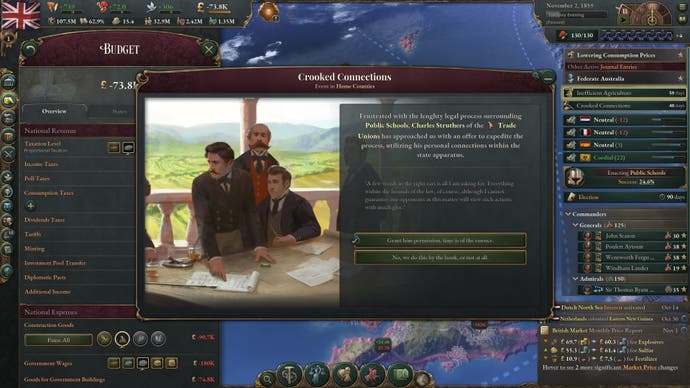
Consequently, it's prudent to approach which laws you enact carefully, what you push for, and what you compromise on. Maybe it's worth letting the industrialists have their free trade economy if it gets children out of the mines and into schools. Maybe sticking with a monarchy is tolerable if you get a public health service out of it. Pushing in the opposite direction to create an oppressive military dictatorship is also viable, as is simply following the money to whatever creates the most profitable nation. There will also be times when you have no choice in the matter whatsoever. If an election puts a party of religiously devout landowners in power, don't expect to be formulating your atheist anarchists' commune any time soon.
While systemically Victoria 3 paints politics in broad strokes of interests and population groups, sometimes these seismic social shifts get attached to specific faces. Pushing through new laws takes time, and will periodically trigger events where individuals rise to the surface. Perhaps the Duke of Wellington gets caught in a brothel, damaging the reputation of the industrialists he represents. Alternatively, maybe the lead proponent of your new taxation law suddenly drops dead, sparking a debate about the decency of continuing proceedings without him. In this way, Victoria 3 makes the push-me, pull-you of daily political wrangling comprehensible at a personal level.
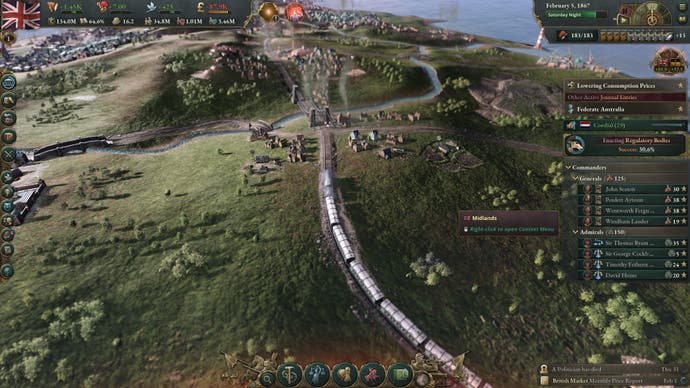
Indeed, while Victoria 3 doesn't feature the dramatic familial-soap operas of Crusader Kings, it is an extremely characterful game in its own right. Many nations have their own specific events to deal with, Britain, for example, sees a Jack-the-Ripper inspired mystery with a genuinely surprising twist, all of which ties into the game's simulation of emerging police forces. This character is also evident in the general presentation, from the elegant, filigree-edged UI, to the way countries dramatically evolve over time. Cities expand, railways extend their filaments across the map, and sailing clippers are slowly replaced by ironclad steamers.
As a game of political and economic craftsmanship, Victoria 3 is a resounding success. Taking a country and shaping it how you want is tremendous fun. The game is less effective when it comes to dealing with other countries, however. Diplomacy is split between diplomatic plays (wars), and diplomatic actions (everything else). There are tons of options in both, but they're all fairly binary, one-on-one interactions. You're either entreating with another country, or declaring war on it for a very specific reason. The system is lacking in subterfuge, the ability to play countries off one another for your own national gain.
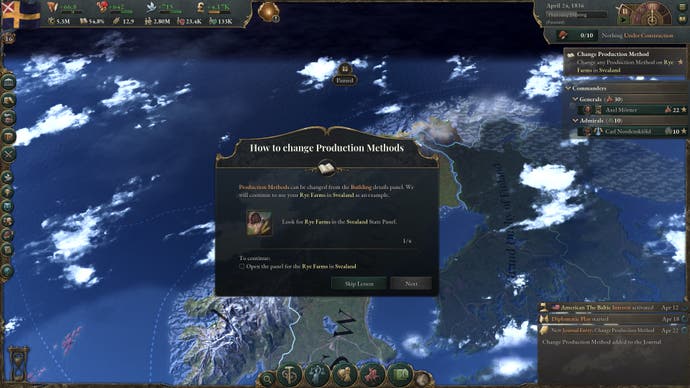
Warfare, meanwhile, is where Victoria 3 is at its least interesting. Managing wars is broadly similar to previous Paradox games, with conflicts ultimately being defined by your country's will to fight, which can be influenced by factors like attacking trade routes, winning battles, and occupying enemy territory. But you can only field armies on auto-generated fronts, which can lead to some odd situations. I ended up in a war with Austria for convoluted diplomatic reasons, but there were no available fronts to field armies on, and because of a couple of obscure game rules, I could only lower my enemy's war score to a certain level while mine could freely plummet like pound sterling. As a result, I ended up having to pay reparations for losing a war in which I never directly fought my enemy.
In fairness to Paradox, this sounds like something that could very well happen in a nineteenth-century war. From a play perspective, however, it's not much fun. That being said, war is often fascinating from an economic perspective, like when some bizarre conflagration between Russia and Japan ends up knocking out your most lucrative trade-route, or sends the price of ammunition into the stratosphere.
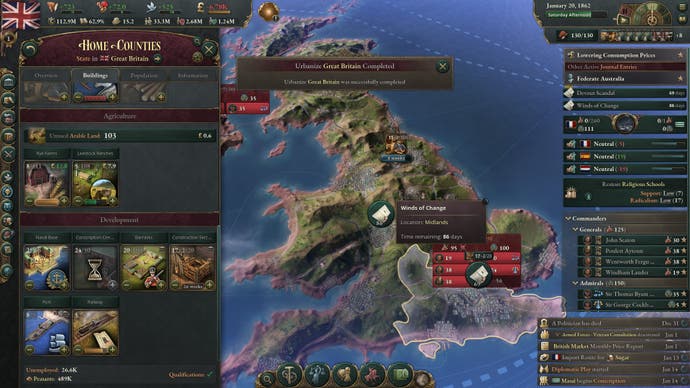
There are a couple of other urchins in the works worth addressing. The tech-tree mostly exists for gating purposes. Ultimately, you want pretty much everything on it, and it's tiered in such a way that pushing for a specific technology is only occasionally worthwhile. Moreover, managing trade routes is a headache when playing as a larger nation, as they constantly outgrow your available number of convoys, and there's no way to prioritise specific trade routes if there's an item that you really want to import or export.
There are areas where Victoria 3 could be better, but it's ultimately a game about the development of modern nations, and that theme is brought roaringly to life with its powerhouse economic engine, while the political side of the game lends a pleasingly human face to the reams of numbers you'll be crunching. Comparisons with Crusader Kings 3 will naturally abound, and it's hard to beat a game that lets you literally eat kings. But the fact Victoria 3 makes building Lancastrian coal mines similarly compelling is a remarkable achievement.
